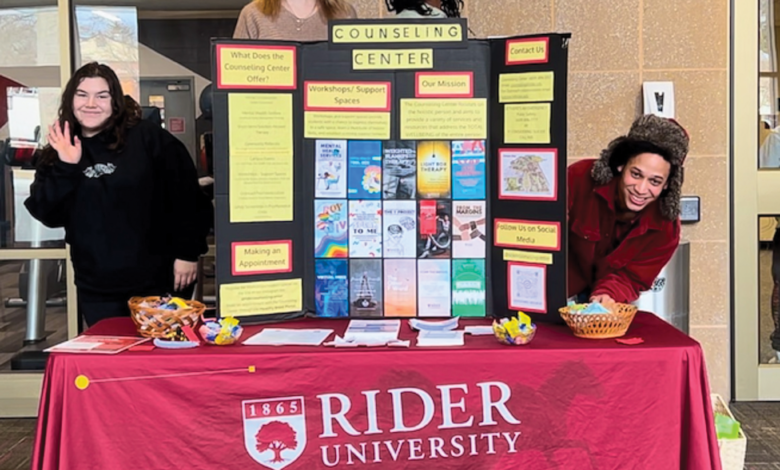
Counseling center creates space for underrepresented students
By Julia Train
In July, Rider received a $200,000 state-funded grant to use toward mental health resources for underrepresented students. During the fall semester, the counseling center began creating ways to use the funds to support those who are part of the LGBTQIA+ community, athletes and students with autism.
This semester, the Rider community gets to see those initiatives in action.
In an Oct. 13 interview with The Rider News, Anissa Moody, director of the counseling center and staff psychologist, mentioned that the center has teamed up with local partners and added support groups, mentors and counselors.
Along with a partnership with The PRIDE Center in Ewing, specialized counselors, a peer education program, new and renamed support groups and a revamped sensory room were all added to the counseling center’s offerings.
While larger colleges, like Rutgers, have a team of therapists who specialize in specific topics, smaller schools like Rider typically don’t.
“It’s not possible for one therapist to be trained in every single possible need that somebody could have,” said Jonah Friedman, the new counselor specializing LGBTQIA+ related issues. “Our goal is to get people the services that they deserve and that they need, and we can do that much better when we have these community partnerships where you can get that specific tailored treatment.”
New counselors
Friedman, who is part of the LGBTQIA+ community himself, is one of the specialized counselors added through the grant.
According to 2022 research conducted and published by The Trevor Project, a nonprofit organization that focuses on suicide prevention in the LGBTQIA+ community, “LGBTQ college students with access to mental health services through their college had 84% lower odds of attempting suicide in the past year compared to LGBTQ college students without access.”
Along with being a counselor, Friedman also hosts a support group, Roy. G. Biv, for queer students every Friday at 11 a.m. in the counseling center.
According to Friedman, the purpose is “to provide community and support and information for queer students in a safe space.”
Along with Friedman, a trauma counselor was hired for Womanspace, who will be on campus for several hours a week to provide specific trauma therapy for students who have experienced sexual assault or domestic violence.
The PEPers
The Peer Education Program, also referred to as the “PEP team” or “PEPers,” is made up of five undergraduate students who are interested in a career in psychology in one way or another. They’re trained to work with the outreach team to connect with their peers and provide support in a way that graduate assistants or counselors might not be able to.
Within five weeks of the program, Moody said the counseling center has already seen an uptick in student engagement.
She said there’s less of a stigma around meeting up with a fellow student to talk about what’s going on in their life than going to the counseling center.
Friedman added that the program helps the counseling center become more accessible for students.
“Part of that is having undergrads, or PEPers, that are just able to relate and integrate into these events in a way that is supplemental to what we’re already doing,” said Friedman.
He said that the goal is to meet “Students where they are,” meaning that everyone is at a different place in their lives and therapeutic journeys, so therapists don’t want to push their patients to open up about topics they’re not ready to discuss.
At the end of the fall semester, interviews were conducted to fill the team. Over winter break, the PEPers made a commitment to participate in a training course from the National Association of Student Personnel Administrators.
Throughout January, they learned about a wide range of topics relevant to college campuses that may arise, such as confidentiality, health promotion and primary prevention.
Moody said that the grant has allowed the counseling center to give students more time and more specific help in order to help them heal and come to know themselves.
“One of the things that I love about Rider [is] we have such an open and welcoming kind of community. … Students can be themselves,” Moody said. “We really want students to know that now we have more specialized services to support them.”


